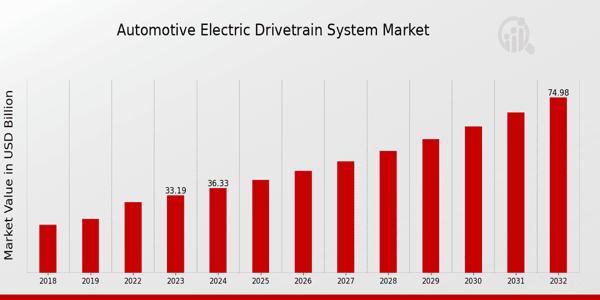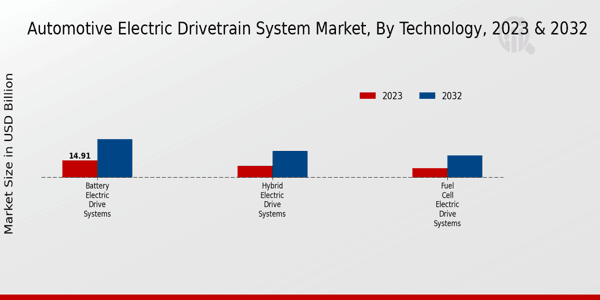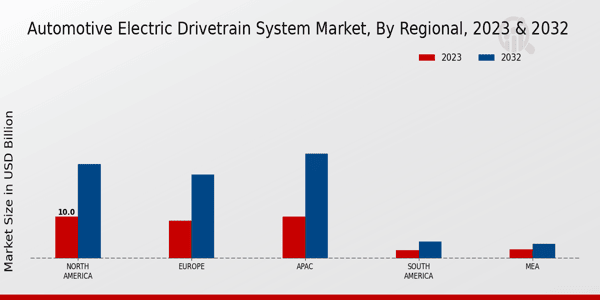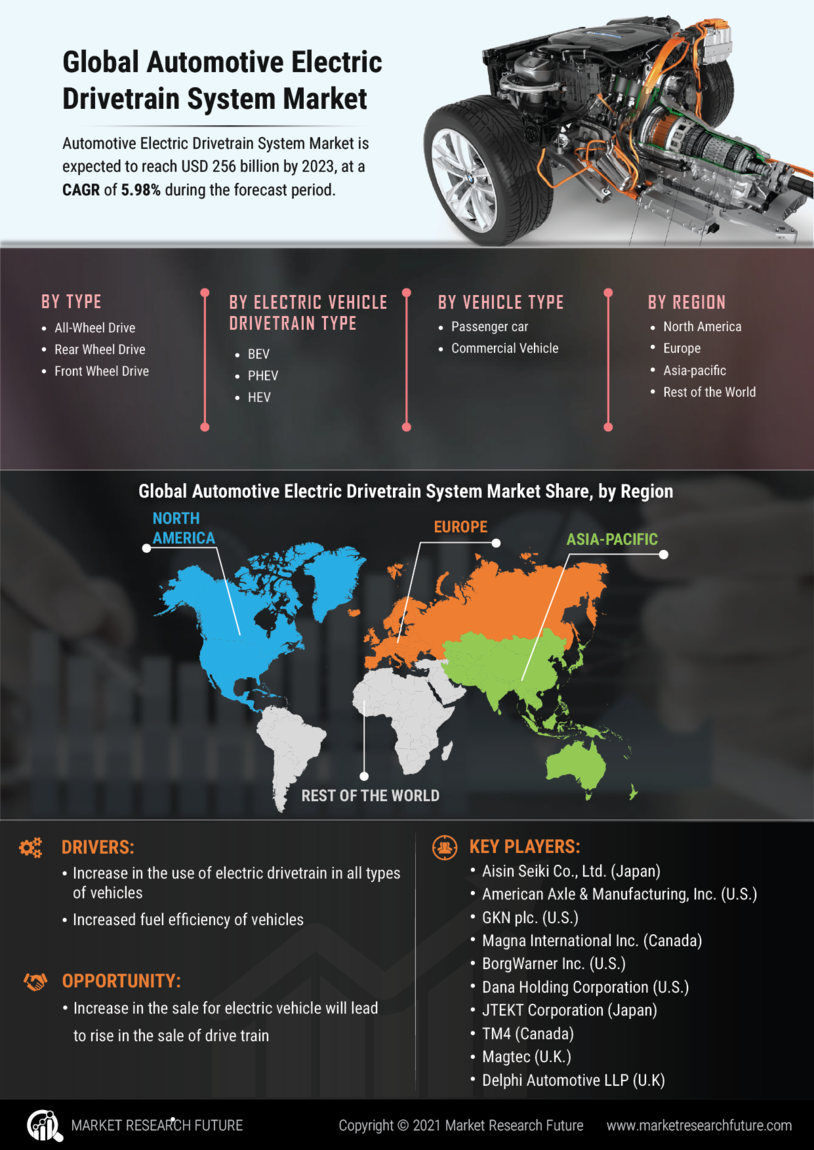Global Automotive Electric Drivetrain System Market Overview:
As per MRFR analysis, the Automotive Electric Drivetrain System Market Size was estimated at 30.31 (USD Billion) in 2022. The Automotive Electric Drivetrain System Market Industry is expected to grow from 33.19 (USD Billion) in 2023 to 75.0 (USD Billion) by 2032. The Automotive Electric Drivetrain System Market CAGR (growth rate) is expected to be around 9.48% during the forecast period (2024 - 2032).
Key Automotive Electric Drivetrain System Market Trends Highlighted
The Automotive Electric Drivetrain System Market has been expanding at a phenomenal rate, partly due to the change in consumer preferences towards electric vehicles. All across the world, governments are implementing strict norms for emission control while also encouraging electric vehicles, thereby enhancing the market. An increase in demand for electric drivelines is due to changing market conditions forcing the manufacturers to spend massively on product development and research. The Fuel prices are escalating while measures global measures to reduce the carbon footprints of both personal and fleet transportation increase the momentum of the market.
New opportunities are coming up for the manufacturers as they seek diversification in their product lines to meet the different tastes and preferences of consumers.
The rise of autonomous vehicles presents a unique chance to integrate advanced electric drivetrains that enhance vehicle performance and efficiency. There's a growing interest in smart charging solutions and renewable energy sources to power electric drivetrains, which could lead to partnerships and new business models. Additionally, innovations in battery technology and energy storage systems open avenues for development in electric drivetrains, making them more competitive with traditional internal combustion engines. Recent trends indicate a strong shift towards hybrid systems, where electric drivetrains work alongside internal combustion engines to enhance fuel efficiency and reduce emissions.
Furthermore, the advent of artificial intelligence and connected technologies is being integrated into electric drivetrains, enhancing vehicle performance, safety, and user experience. Companies are also focusing on lightweight materials to improve energy efficiency further. As the automotive industry adapts to changing consumer expectations and regulatory landscapes, the electric drivetrain market stands at the forefront of this transformation, shaping the future of mobility.

Source: Primary Research, Secondary Research, MRFR Database and Analyst Review
Automotive Electric Drivetrain System Market Drivers
Increasing Demand for Electric Vehicles (EVs)
The Automotive Electric Drivetrain System Market is experiencing significant growth driven by the increasing demand for electric vehicles (EVs). As consumers become more environmentally conscious and governments implement stricter emissions regulations, the shift towards electric mobility is accelerating. Manufacturers are investing heavily in developing electric drivetrains to enhance the performance and efficiency of their vehicles. With advanced battery technology and improved charging infrastructure, more consumers are considering EVs as viable alternatives to traditional internal combustion engine vehicles.
This demand for EVs is creating a robust market for electric drivetrain systems, as they are essential components that enable these vehicles to operate efficiently. The need for high-performance electric drivetrains that offer enhanced torque and faster acceleration is pushing companies to innovate and collaborate, further propelling the growth of the Automotive Electric Drivetrain System Industry. Companies are also exploring various configurations of electric drivetrains, including hybrid and plug-in hybrid systems, to cater to a diverse range of consumer preferences and driving needs.
Government Initiatives and Incentives
Governments worldwide are promoting electric vehicles and their supporting technologies through various initiatives and incentives. Subsidies, tax breaks, and rebates for electric vehicle purchases are encouraging consumers to transition to EVs, consequently driving the need for sophisticated electric drivetrain systems. Additionally, governments are investing in research and development and supporting infrastructure, such as charging stations, further boosting the Automotive Electric Drivetrain System Industry. This supportive regulatory environment plays a crucial role in shaping market dynamics.
Technological Advancements in Electric Drivetrain Systems
Rapid technological advancements in electric drivetrain systems are a significant driver of market growth. Innovations in materials, design, and production processes are leading to more efficient and cost-effective electric drivetrains. Enhanced battery technologies, such as solid-state batteries, are improving energy density and reducing charging times, directly influencing consumer adoption rates. In addition, the integration of smart technologies, such as electric control units and artificial intelligence in drivetrains, is optimizing vehicle performance and increasing the appeal of electric vehicles.
As the Automotive Electric Drivetrain System Industry continues to evolve with these advancements, automakers are better positioned to meet consumer demands for performance, reliability, and sustainability.
Automotive Electric Drivetrain System Market Segment Insights:
Automotive Electric Drivetrain System Market Technology Insights
The Automotive Electric Drivetrain System Market is undergoing significant transformation with a strong emphasis on technology, which is poised to play a pivotal role in shaping its future. In 2023, the market valuation is recorded at 33.19 USD Billion, reflecting a robust growth trajectory that is expected to evolve over the next decade. A closer look at the market segmentation reveals three prominent categories: Battery Electric Drive Systems, Hybrid Electric Drive Systems, and Fuel Cell Electric Drive Systems, each contributing uniquely to overall market dynamics.
Battery Electric Drive Systems currently hold the majority share with a valuation of 14.91 USD Billion in 2023, and this segment is anticipated to grow to 33.0 USD Billion by 2032. This illustrates the increasing consumer preference for fully electric vehicles, driven by advancements in battery technology and an overall shift toward sustainable transportation solutions.
The Hybrid Electric Drive Systems follows with a notable valuation of 10.1 USD Billion in 2023, projected to expand to 23.0 USD Billion in 2032, showcasing its significance in blending traditional internal combustion engines with electric power, thus appealing to a broader market segment that seeks transitional technologies.
Meanwhile, the Fuel Cell Electric Drive Systems is valued at 8.18 USD Billion in 2023, with expectations of reaching 19.0 USD Billion by 2032. This segment, although smaller, plays a critical role in specialized applications such as commercial vehicles and public transportation, where extended range and rapid refueling capabilities are essential. The interplay between these technology categories illustrates a complex landscape where electric drivetrains are driving innovation and competition within the automotive industry. Growth drivers include stringent emission regulations, escalating fuel prices, and advancements in charging infrastructure, while challenges such as high production costs and supply chain constraints remain prevalent.
Collectively, the Automotive Electric Drivetrain System Market represents a future-oriented industry undergoing rapid evolution, where technology segmentation continues to influence vehicle design, performance, and consumer acceptance of electric mobility solutions.

Source: Primary Research, Secondary Research, MRFR Database and Analyst Review
Automotive Electric Drivetrain System Market Component Insights
The Automotive Electric Drivetrain System Market, valued at 33.19 USD Billion in 2023, is experiencing substantial growth driven by several components essential to electric vehicles. The Component segment includes vital elements such as Electric Motors, Power Electronics, Transmissions, and Batteries, each playing a crucial role in the efficiency and performance of electric drivetrains. Electric Motors are pivotal for converting electrical energy into mechanical energy, driving vehicles more efficiently than traditional engines. Power Electronics manage the flow of electrical energy, which is essential for optimizing vehicle acceleration and overall energy use.
Transmissions in electric vehicles differ from conventional systems, often simplifying design and enhancing efficiency. Batteries are integral for energy storage and play a significant role in determining vehicle range and charging times. As the world shifts towards sustainable transportation, advancements in these components are vital for meeting increasing consumer demand and regulatory standards. The expansion of the Automotive Electric Drivetrain System Market is supported by a trend toward electrification, with growth opportunities emerging from ongoing innovations in battery technologies and energy management systems, reflecting the evolving automotive landscape.
Automotive Electric Drivetrain System Market Vehicle Type Insights
The Automotive Electric Drivetrain System Market is witnessing significant growth, with a market value of 33.19 USD Billion in 2023, driven primarily by advancements in Vehicle Type segments such as Passenger Vehicles, Commercial Vehicles, Two-Wheelers, and Heavy-Duty Vehicles. Among these, Passenger Vehicles are pivotal, accounting for a substantial proportion of the market share as consumers increasingly prefer electric options for personal transportation due to environmental concerns and cost-efficiency. Commercial Vehicles are also gaining traction; their adoption of electric drivetrains contributes to reduced operational costs and emissions, making them essential in logistics and urban transport.
Moreover, the Two-Wheeler segment is witnessing rapid growth, especially in emerging markets, where urban mobility solutions are in high demand, while Heavy-Duty Vehicles play a crucial role in freight transportation, driving innovations in electrification to meet regulatory standards. The Automotive Electric Drivetrain System Market data reflects a growing trend towards sustainable technology, supported by the declining costs of batteries and government incentives. These factors collectively affirm the importance and adaptability of various vehicle types within the market as they continue to evolve amidst challenges such as charging infrastructure and consumer perception.
Automotive Electric Drivetrain System Market End-Use Insights
The Automotive Electric Drivetrain System Market is poised for substantial growth, with a market valuation of 33.19 USD Billion in 2023. The End Use segment showcases diverse applications, prominently including Personal Use, Fleet Operations, and Public Transport. Personal Use is experiencing increased adoption due to rising consumer awareness regarding environmental sustainability, while Fleet Operations highlights the significant demand for efficient energy solutions that reduce operational costs. The Public Transport sector remains critical, driven by urbanization trends and government initiatives promoting electric vehicles to enhance public mobility.
These factors contribute to the overall expansion of the Automotive Electric Drivetrain System Market, reflecting evolving consumer preferences and regulatory landscapes. With the market expected to reach 75.0 USD Billion by 2032, there are opportunities for technological advancements and innovation in this segment, further solidifying its importance in the Automotive Electric Drivetrain System industry. Additionally, the market growth is fueled by the increasing investments in electric infrastructure, addressing key challenges like charging station accessibility and battery technology advancement, thereby enabling broader adoption across these end uses.
Automotive Electric Drivetrain System Market Regional Insights
The Automotive Electric Drivetrain System Market is witnessing substantial growth across various regional segments, with a valuation of 33.19 USD Billion in 2023. North America commands a significant share, starting at 10.0 USD Billion in 2023 and projected to reach 22.5 USD Billion by 2032, demonstrating its majority holding in the market due to technological advancements and increasing electric vehicle adoption. Europe closely follows with a valuation of 9.0 USD Billion in 2023, anticipated to rise to 20.0 USD Billion, fueled by stringent environmental regulations and a robust automotive sector focused on electrification.
The APAC region, equally important, is valued at 10.0 USD Billion as of 2023 and is expected to grow to 25.0 USD Billion, making it a key player due to its large manufacturing base and rising consumer demand for electric vehicles. South America is on a smaller scale, valued at 2.0 USD Billion in 2023 with a forecasted growth of 4.0 USD Billion, while the MEA region starts at 2.19 USD Billion and is projected to reach 3.5 USD Billion by 2032, indicating its developing market potential.
The interplay of these factors contributes to the Automotive Electric Drivetrain System Market data, revealing a diversified landscape of opportunities and challenges across different regions.

Source: Primary Research, Secondary Research, MRFR Database and Analyst Review
Automotive Electric Drivetrain System Market Key Players and Competitive Insights:
The Automotive Electric Drivetrain System Market is witnessing significant transformation, driven by the transition to electric vehicles and rigorous emission regulations. This market is characterized by increasing technological advancements, such as the integration of multi-speed transmissions and advanced battery management systems, which enhance the efficiency and performance of electric drivetrains.
Key players in this sector focus on R&D to offer innovative solutions, improving energy efficiency and reducing the overall weight of vehicles, aiming to achieve better range and performance. As competition intensifies, companies are forming strategic partnerships and collaborations to leverage emerging technologies. Consumer preferences have also shifted towards electrification, compelling manufacturers to invest heavily in developing robust electric drivetrain systems that cater to the evolving automotive landscape.
LG Electronics has solidified its position within the Automotive Electric Drivetrain System Market by showcasing its commitment to cutting-edge technology and sustainable practices. The company has developed advanced electric motor systems that are designed for optimal performance and energy efficiency. With a strong focus on R&D, LG Electronics has been successful in creating innovative solutions that address the growing demand for reliable, high-performance electric drivetrains. Furthermore, LG's extensive experience in consumer electronics translates into high-quality components that are increasingly being adopted in the automotive sector.
This technological prowess, combined with a robust supply chain and partnerships with leading automotive manufacturers, enhances LG Electronics' market presence and competitive edge in the landscape of automotive electric drivetrains.
Ford, a longstanding leader in the automotive industry, is actively enhancing its foothold in the Automotive Electric Drivetrain System Market with a focus on electrification and sustainability. The company has committed significant resources to developing electric vehicles and advanced drivetrain technologies, positioning itself as a front-runner in the transition to electric mobility. Ford's strategy encompasses not only the production of electric vehicles but also the development of proprietary electric drivetrain systems that optimize performance and efficiency.
Their expertise in vehicle manufacturing, coupled with innovative electric motor technology, enables them to deliver an exceptional driving experience with electric vehicles that meet customer expectations. Ford's strong brand recognition and commitment to environmental sustainability resonate with consumers, thereby reinforcing its competitive stance within the automotive electric drivetrain sector.
Key Companies in the Automotive Electric Drivetrain System Market Include:
Automotive Electric Drivetrain System Market Developments
Recent developments in the Automotive Electric Drivetrain System Sector indicate a robust shift towards electrification, with major players like Ford and General Motors announcing substantial investments in electric vehicle technologies. Ford recently unveiled plans to enhance its electric truck lineup, signaling strong commitments to sustainable transportation. Toyota and Honda are collaborating to develop next-generation solid-state batteries, aiming to improve efficiency and performance in their electric vehicles.
Volkswagen's strategic push into the electric vehicle sector is evidenced by its collaboration with Bosch to enhance electric drivetrain capabilities, while Daimler continues to expand its EQ line, reinforcing commitments to an electric future. On the acquisition front, Aptiv made headlines by acquiring a software company focused on electric vehicle technology, aiming to integrate advanced software solutions into their drivetrains. Growth in the market valuation of companies like Tesla and BMW further illustrates the increasing demand for electric drivetrains, with notable investments driving advancements in technology and production.
Overall, the competitive landscape is evolving rapidly as these companies seek to lead in the burgeoning electric sector.
Automotive Electric Drivetrain System Market Segmentation Insights
Automotive Electric Drivetrain System Market Technology Outlook
- Battery Electric Drive Systems
- Hybrid Electric Drive Systems
- Fuel Cell Electric Drive Systems
Automotive Electric Drivetrain System Market Component Outlook
Automotive Electric Drivetrain System Market Vehicle Type Outlook
Automotive Electric Drivetrain System Market End-Use Outlook
Automotive Electric Drivetrain System Market Regional Outlook
| Attribute/Metric |
Details |
| Market Size 2022 |
30.31 (USD Billion) |
| Market Size 2023 |
33.19 (USD Billion) |
| Market Size 2032 |
75.0 (USD Billion) |
| Compound Annual Growth Rate (CAGR) |
9.48% (2024 - 2032) |
| Report Coverage |
Revenue Forecast, Competitive Landscape, Growth Factors, and Trends |
| Base Year |
2023 |
| Market Forecast Period |
2024 - 2032 |
| Historical Data |
2019 - 2023 |
| Market Forecast Units |
USD Billion |
| Key Companies Profiled |
LG Electronics, Ford, Bosch, Toyota, Hyundai, Honda, FCA, General Motors, Porsche, Volkswagen, Daimler, Aptiv, Tesla, BMW, Nissan |
| Segments Covered |
Technology, Component, Vehicle Type, End Use, Regional |
| Key Market Opportunities |
Increasing demand for EVs, Government incentives for electric vehicles, Advancements in battery technology, Expanding electric vehicle charging infrastructure, Growing environmental regulations and standards |
| Key Market Dynamics |
Growing electric vehicle adoption, Regulatory emissions standards, Advancements in battery technology, Increasing consumer awareness, Improved charging infrastructure |
| Countries Covered |
North America, Europe, APAC, South America, MEA |
Automotive Electric Drivetrain System Market Highlights:
Frequently Asked Questions (FAQ):
The market is expected to be valued at 75.0 USD Billion by 2032.
The market is expected to exhibit a CAGR of 9.48% from 2024 to 2032.
The market for Battery Electric Drive Systems is expected to be valued at 14.91 USD Billion in 2023 and 33.0 USD Billion in 2032.
Hybrid Electric Drive Systems are expected to grow from 10.1 USD Billion in 2023 to 23.0 USD Billion in 2032.
Major players include LG Electronics, Ford, Bosch, Toyota, Hyundai, and Tesla.
The market for Fuel Cell Electric Drive Systems is anticipated to reach 19.0 USD Billion by 2032.
Europe is expected to reach a market size of 20.0 USD Billion by 2032.
The market value for South America is projected to be 4.0 USD Billion in 2032.
The MEA market is expected to grow from 2.19 USD Billion in 2023 to 3.5 USD Billion in 2032.


















